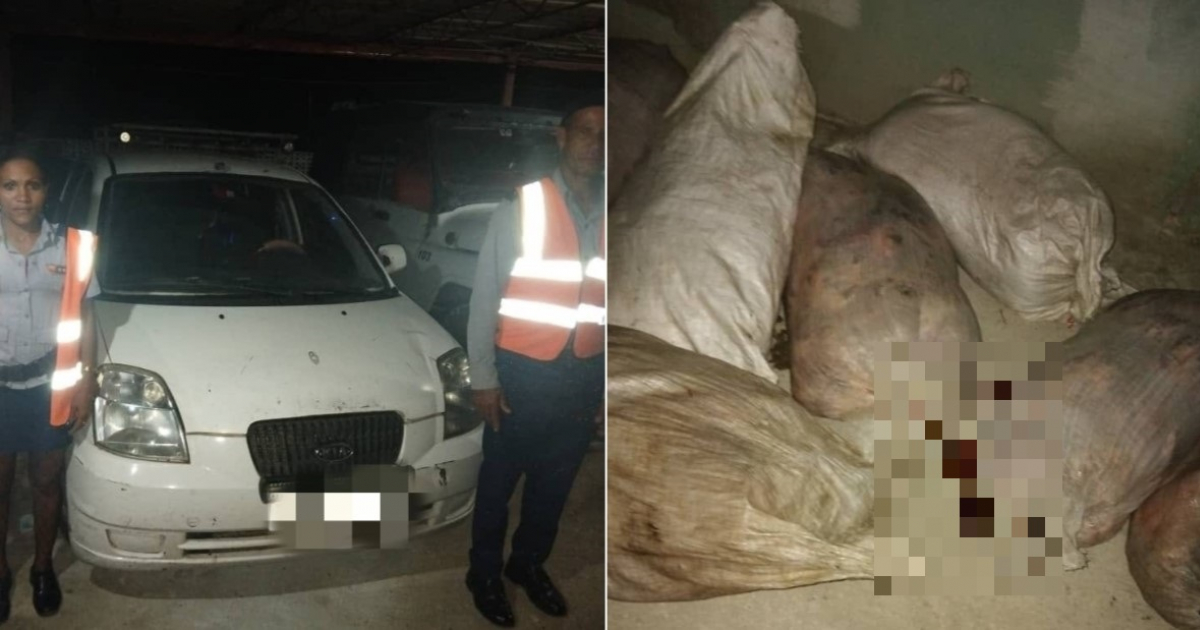In a continued effort by the Cuban regime to crack down on illegal activities, the confiscation of 10 sacks of beef in Granma underscores the relentless pursuit of the black market. However, these actions fail to address the core issue: the scarcity of basic food supplies that drives the population to such measures for survival.
According to the pro-government Facebook page "Héroes de Azul," 10 sacks of beef were seized at the Jucarito Checkpoint, located between Granma and Las Tunas. The beef was being transported by two individuals in a private vehicle. The post stated that those involved were identified and taken, along with the goods, to the police station for further investigation.
In another report, the same official page detailed a separate seizure in Granma province related to the illegal slaughter of cattle. Officers in patrol car 516, while conducting an operation near the Carlos Manuel de Céspedes Airport, discovered a bicycle taxi carrying 74 kilograms of beef, including meat, bones, hooves, and ribs. The individual involved was apprehended and transported to the police station for the necessary investigations.
The Cuban government points to the illegal cattle slaughter as a primary factor hindering the development of the country's livestock sector, highlighting its detrimental impact on the economy and imposing harsh penalties for this offense. Yet, this official narrative overlooks the underlying issues: decades of failed economic policies and a system that stifles agricultural and livestock producers.
The harsh penalties for cattle slaughter starkly contrast with the lack of effective solutions to ensure access to beef in legal markets, where the majority of Cubans cannot afford it due to exorbitant prices and chronic shortages. Meanwhile, operations like these, although praised on official platforms, reveal the disconnect between the regime's priorities and the urgent needs of a population that turns to the black market as their sole means of survival.
As part of the "National Exercise for Crime Prevention and Combatting Corruption, Illegalities, and Social Indiscipline," directed by the Cuban leader to take place from December 2 to 7, authorities in Santiago de Cuba discovered two oxen in a household, allegedly intended for illegal slaughter. This incident highlights that as long as beef remains scarce in Cuba's formal sales outlets, the black market will continue to thrive with a high demand for this product.
In October, it was reported that a total of 1,615 Cuban citizens have been penalized in 2024 for behaviors linked to the illegal slaughter of cattle and trafficking of their meat, according to the official newspaper Granma. An article by Tomás Betancourt and Alina de Fátima Santana, both magistrates of the Supreme People's Court, revealed that 90 percent of those prosecuted received prison sentences, with 78 percent sentenced to up to 15 years.
Understanding the Struggles of Cuba's Beef Market
Why is beef scarce in Cuba's legal markets?
Beef is scarce in Cuba's legal markets due to a combination of failed economic policies, government restrictions on cattle farming, and a lack of incentives for agricultural producers, leading to limited supply and high prices.
What are the penalties for illegal cattle slaughter in Cuba?
The penalties for illegal cattle slaughter in Cuba are severe, with many individuals facing prison sentences. The majority of those prosecuted receive sentences of up to 15 years, reflecting the government's strict stance on this issue.
How does the black market affect Cuba's beef supply?
The black market plays a significant role in Cuba's beef supply, offering an alternative source for those unable to afford or access beef through legal channels. However, it also perpetuates illegal activities and complicates efforts to regulate the market.
